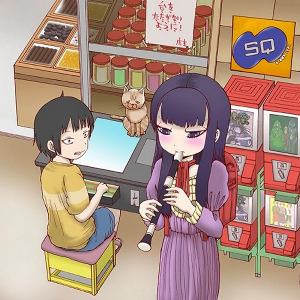Cure SQ
 |
Album Title: Cure SQ |
| Record Label: Square Enix |
|
| Catalog No.: SQEX-10412 |
|
| Release Date: December 11, 2013 |
|
| Purchase: Buy at CDJapan |
Overview
Cure SQ is something of a black sheep among the SQ series. While it features arrangements of a range of Square Enix titles, it differs from other albums in that it was created by just one ensemble. The Kuricorder Quartet, a veteran recorder quartet that have featured on multiple albums, soundtracks, and concerts, were asked to create this album. They demonstrate that the music of Square Enix can transition well on to the recorder, of all instrument families, but don’t necessarily provide the fully-fledged album most would expect.
Body
The opening and closing tracks here are respectively adaptations of Romancing SaGa and Final Fantasy‘s opening themes. In both tracks, arranger Masaki Kurihara convincingly adapts both themes for recorder ensemble. He presents the original melodies warmly on soprano and alto recorder while providing a robust accompaniment with tenor recorder, bass recorder, and ukulele/guitar. Reflecting their years playing together, the performers appropriately articulate their respective parts while harmonising beautifully with one another. Though the recorder inherently exudes a sweet sound, through well-executed arrangements and performances, the ensemble are still able to recapture the boundless feel of Romancing SaGa‘s opening and the majesty of Final Fantasy‘s main theme. These are no elementary school performances, but rather professional arrangements.
Some of the arrangements featured on Cure SQ are extremely likeable. It was delightful to hear the themes for Gogo and Zozo, two of the most underrated tracks from Final Fantasy VI, presented into an arrangement here. The quartet capture the quirky, lyrical nature of the originals and incorporate a few fun surprises along the way. Also lovely is the tenth track, which interweaves the themes of the same game’s Gau and Relm into an tender, innocent arrangement befitting the recorder. Another humble but charming rendition of a cult classic is Live A Live‘s “GO! GO! Buriki King”. This one shifts away from the recorder quarter format of the rest of the album by focusing on soprano recorder, ukulele, and melodica. Further timbral variety is brought to the album with “Clash on the Big Bridge”, a calm but motive rendition of the classic battle theme driven by ukulele and bongos. The quartet also prove themselves to be musical polyglots with “Red Wings”, a more ambitious arrangement featuring recorders, crumhorns, saxophone, tuba, melodica, and even a jew’s harp.
While the arrangements are generally competent, they tread very closely to their originals. This is particularly reflected by the closing theme, which is written in a straightforward heterophonic form and rarely deviates from the original melodies. Little splashes of colour do help, for example the way the soprano and alto recorders intricately harmonise one another, but the arrangement mostly resembles a well-done reduction of the original. Likewise, while “Wind Scene” unsurprisingly transitions well to the recorder ensemble, much of it is a note-by-note translation of the original. However, the biggest problem with Cure SQ is its 32-minute length. While it spans some eleven tracks, three of these are 30-second jingles: SaGa‘s “Eat the Meat”, Final Fantasy‘s “Victory Fanfare”, and Final Fantasy III‘s “Hello! Big Chocobo”. As delighted as I was hear the goofball Big Chocobo theme one more time, I couldn’t help but feel a little cheated by the lack of new content for a 2100 JPY disc.
Summary
The content of Cure SQ is essentially good. The Kuricorder Quartet proves themselves to be competent arrangers and performers, presenting fan favourites from the Final Fantasy series and beyond on to another surprising ensemble. However, the album is a little too conservative and samey to be particularly interesting aside from a few tracks, and it’s 32 minute playtime is also quite disappointing. This album isn’t a bad buy, but there are better albums in the SQ series.
Do you agree with the review and score? Let us know in the comments below!
3
Posted on December 30, 2015 by Chris Greening. Last modified on December 29, 2015.













